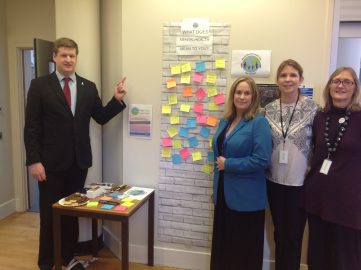The shopping centre manager walked towards me with an urgency that you don’t often see. I was giving out surveys to passers by when he approached me with concerns about the welfare of a young person who was threatening to take their own life in the car park. They had convinced this person to seek help.
Their first reaction after this was to call the Police but they were at a loss to know what else to do. I suggested that he might like to telephone the local NHS mental health team to see what help they could offer, and perhaps come and see her. When he did so, I was surprised then by what I heard. He was told “call the Police – it will be quicker”.
Sadly, this wasn’t the first time that I have been involved with a case whereby someone might take their own life. It’s happened twice before. But I was taken back by the ease with which a medical professional, who admittedly might be under pressure too, would pass a vulnerable person to potentially the wrong source of support. This is the reality of some of the demand on Policing in 2018 they’re there 24/7. It is one third of all Kent Police time alone.
It is an honour to serve the residents of Kent as their Police and Crime Commissioner and lead on this issue for the APCC. As I reach the midpoint in my first term, as one of the second generation of PCCs, I have seen time and time again how we have been able to respond decisively and quickly to the challenges in our areas, and mental health is an example of how we are being proactive.
Across the board, we are funding projects that aim to reduce demand on Policing as a result of cases involving mental health. Street triage is prevalent. Call handlers specialising in mental health working in control rooms are more common place. But there are other interventions that are making a difference. And in Mental Health Awareness Week, I think it is important to highlight those brilliant Police Officers and Staff, medical professionals, charities, volunteers and others who are working so hard to deliver this positive change.
I first visited the Dover Outreach Centre whilst they were in the process of renovating a rundown hall that they had procured in Summer 2016. They were investing a lot in this facility to help homeless and vulnerable people to rebuild their lives. This now includes skills, housing, wellbeing and addiction. Last year, they applied to me for funding to undertake cognitive behavioural therapy with the homeless, focusing on those who have a history of contact with the Police. We know through research that a homeless person is nine times more like to take their own life and face barriers in accessing support.
They were awarded £10,000. Their results for the first seven months have already made a difference. Of the 23 they treated, 13 had been known to the Police. Since starting the therapy, 9 haven’t been in contact with the Police for six months, 9 have found long-term housing, 8 have remained substance free and 8 are in sustainable work. For a little investment, a big and real difference has been made to people’s lives.
A few miles up the road in Deal, Talk It Out’s centre has been running for a year and is totally volunteer operated. They’re available throughout the week and their members have set up their own peer support groups for general mental health and specific issues such as anxiety. They see at least 60 different people every week and have become a vital source of mental health, wellbeing and activities. Their research has already shown that prior to their opening, there were up to five crisis calls every week in the area to the Police. There are now as few as three per month. Again, a big difference with a small investment of less than £10,000.
I am pleased to announce that I have been asked to lead the Policing element of the next phase of the independent Mental Health Act review being conducted by Professor Sir Simon Wessley and his team. This is a tremendous honour and opportunity to solve some of the real issues that Policing and the wider health service faces. Issues such as crisis calls, mental health assessment delays, disparities for BAME communities, the use of Police cells and prisoners access to services will all be up for discussion, as well as Police powers.
My focus will continue to be on making sure that those who experience crisis get the best support from all those with whom they come in to contact, and that we do even more to help vulnerable people get the right support from the right person at the right time. Behind every process is a person, like the young person who threatened to take their own life. No matter what we think of the system, we should always remember the individual.


